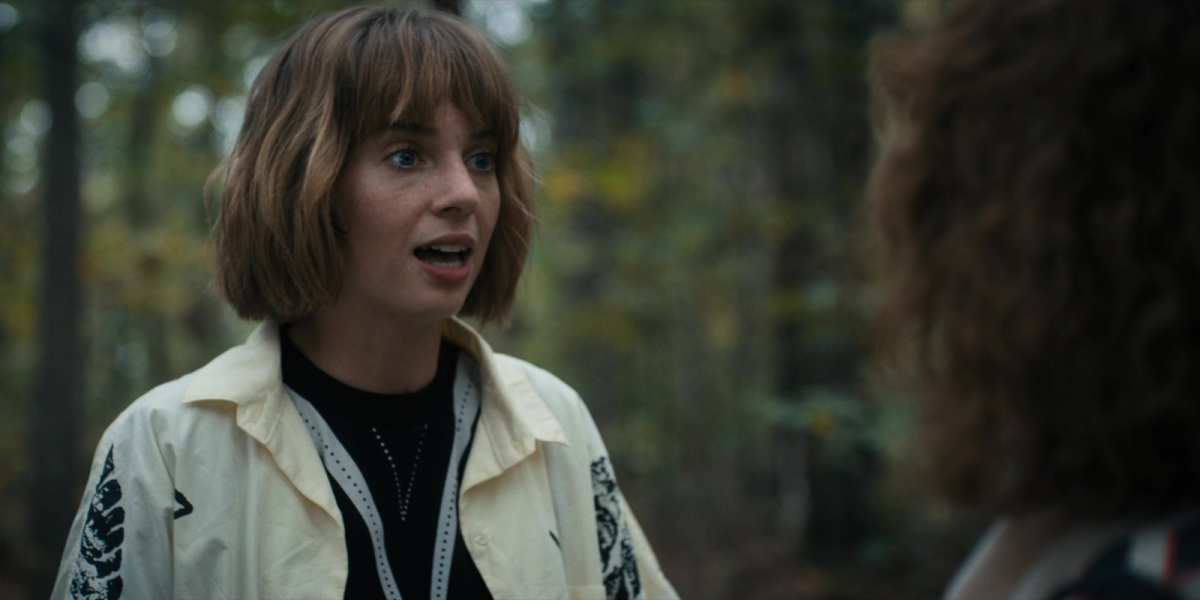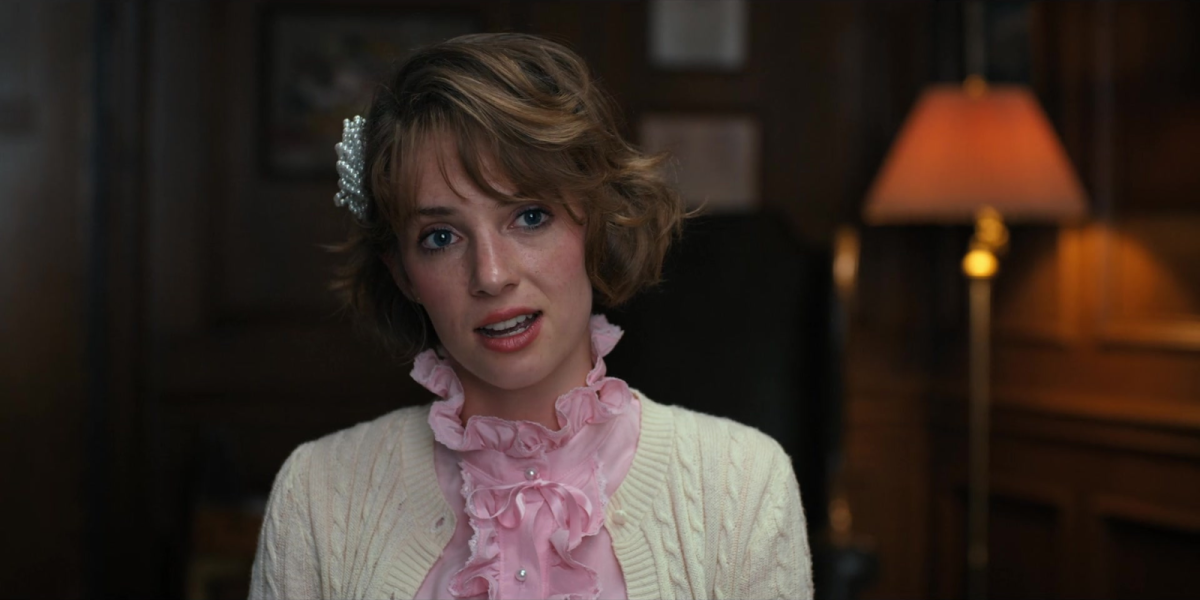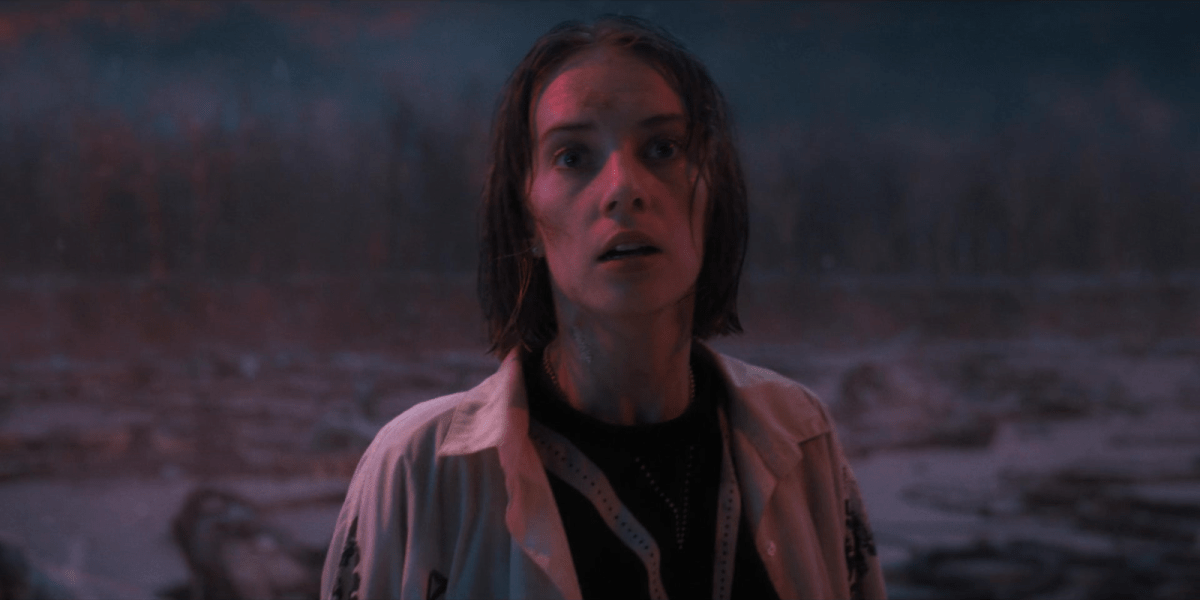Mild spoilers for season four of Stranger Things ahead.
Stranger Things is Netflix’s nostalgia-packed golden child. I remember having mixed feelings about its third season, feelings which can be summed up in two words: Billy Hargrove. But while the abusive, yet redeemed-in-death racist was very much a low point, we also got its highlight in Robin Buckley. Ah, Robin Buckley — what a pleasant surprise she was. A highlight that would grow and further catch my attention in season four, where throughout she spoke to both my lesbian and neurodivergent identities.

Robin was a delight to watch in her season three debut. She was funny, had great chemistry with fan favourite Steve Harrington, and her unique skillset as a polyglot who was familiar with Starcourt Mall proved invaluable. Not only that, but her coming out scene was handled with a lot of care and respect: she wasn’t outed, she wasn’t coerced, she did it of her own volition — and she was accepted. Steve even went out of his way to make her laugh after the fact! It was especially welcome because I remember worrying the two would get hastily paired up. After all, Steve had lost in the love triangle between himself, Jonathan, and Nancy. Years of forced heterosexual romances in TV had me worried, was Robin just going to be his consolation prize? Instead, she trusted him with her identity, Steve accepted her wholeheartedly and their friendship bloomed. It blew me away and honestly left me overjoyed.
Stranger Things isn’t — and honestly shouldn’t be — lauded for its progressive approach to queer rep. Will Byers has been in a “will they or won’t they” (haha) with coming out since the first season, and even Robin herself isn’t groundbreaking. She’s a skinny, white, conventionally attractive lesbian. That said, something about her felt different from other queer characters I’ve seen. I found myself not only relating to her struggles as a closeted lesbian, but to what felt like those of a neurodivergent young woman without the words to truly express or grasp it. As an autistic person, as much as I do look for LGBTQ representation in pop culture, I look for neurodivergent stories a bit more. It makes me feel less lonely, and more understood — and season four Robin pinged that radar.

She started as I remembered, a snarky, stylish-in-a-tacky-lesbian way band nerd, now with a new job at the local video store, and a new crush Vickie, a fellow band kid. I kept watching and in episode two, she confides the following: “I have this problem, where it’s like, I should stop talking. Then I guess I get nervous, and the words keep spilling out.” That’s the first thing where I was like, “Okay, been there.” But I didn’t think anything of it. Don’t we all get nervous around cute girls? And then, in a later episode, she’s paired up with Nancy Wheeler, and her character’s given a chance to shine in contrast to Nancy’s straightlaced nature. They share this exchange in episode three, which gave me genuine pause:
Robin: Did I come off as mean, or condescending or something?
Nancy: No.
Robin: Alright. . . . You don’t know me very well. I don’t really have a filter or a strong grasp of social cues. So if I say something that upsets you, just know that I know it’s a flaw.
Still, I didn’t really think anything of it until one scene locked it in, the one at Pennhurst Mental Hospital, where Robin borrows Nancy’s clothes. She complains about how tight Nancy’s blouse is, how itchy she is, and all her sensory discomforts. When it comes time to convince the hospital warden to let them in, she cuts loose, giving an impassioned speech, simultaneously complaining about her sensory issues, and overall throwing social cues to the wind. And it works — the warden’s convinced. Plus, later on, when they bolt, Robin confides that she has “terrible coordination,” and that she didn’t learn to walk until six months after most kids.
It was around then that my allistic, neurotypical sister asked: “Is Robin autistic?” I had to stop myself from punching the air in sheer celebration. If others see it, I’m not reaching. Finally, finally, an autistic lesbian on TV! Someone I saw so much of myself in! Her bluntness, her inability to read the room, her clumsiness, all things I saw in myself, all things I’d been told were symptoms to hide. She dealt with them too, and nobody saw her as any lesser for it. Hell, in the case of the warden, they actually came in handy.

I was so thrilled, I even went back to season three, to see if there’d been earlier hints. Sure enough, while Robin wasn’t as open about all of her struggles, she’s a self-proclaimed “loser” who spent her time in high school observing, not doing. As an autistic lesbian, it’s like looking in a mirror — high school was a minefield of heterosexual and neurotypical norms, and I acted much the same. I kept to myself, watching other kids flirt and kiss and go to parties, because I didn’t feel like I could act on my own desires and urges.
Now, let’s assume Robin’s neurodivergent behaviour is intentionally written as such — that she is autistic. That would be huge. To have someone so much like me be portrayed as likable and capable, in one of Netflix’s biggest shows ever, is thrilling. Doubly so, as her autistic traits have been some of her strengths. We’re so rarely given that kind of positive portrayal, rarely anything beyond a one-off, a background character, or a painful stereotype. Besides that, I can genuinely count all the queer autistic characters I’ve seen on TV on one hand, none of whom have been in anything as major as Stranger Things. If this was intentional, it’d be a game changer.
Unfortunately, I don’t have my hopes up. Stranger Things takes place in the 1980s, and our understanding of autism has changed in the past forty years. To us, Robin may seem neurodivergent, but back then, she was just quirky. I genuinely can’t imagine anyone else recognizing her as neurodivergent, herself included. Even in my own adolescence, in the 2010s, after my parents had sat me down and told me I was autistic, some part of me still denied the possibility that my brain was different, that my brain was disabled. I was a teenager literal decades after Robin would’ve been, and I still had this idea of autism as exclusively being nonverbal, being obsessed with trains, or being something you grew out of.
Besides, her not being a cis man means her odds of being assessed for autism would be low. Even in the 1990s, it was still assumed that autism was eight times more common in boys, a ratio now lowered to three in one, due to progress in recognizing autism in girls & AFAB folks. I would know, my own diagnosis journey has been long and complicated, and I still get the ever-classic refrain of “you don’t look autistic” on the regular, something cis autistic men in my life have never dealt with.

So, can I praise the Duffer Brothers for a great autistic character? I don’t know. It’s very possible that they weren’t even going for an autistic character, or a character with ADHD, or any other kind of neurodivergence. Sure, she’s clumsy, and not the best with social cues, but for all I know, the Duffer Brothers just gave her those traits as quirks. They’re both, to my knowledge, neurotypical, and neither’s given any indication that Robin was intentionally written this way. If representation isn’t confirmed, wasn’t intentional, and was written by people outside the marginalized group they’re representing, should it still be celebrated? Or is that below the bare minimum? I’m not sure there’s a simple yes or no answer for any of that.
However, I know this much — Robin Buckley in season four of Stranger Things made me happy. I loved seeing a character go through what I do on a daily basis, yet never fail to be funny, charming, and competent. I loved seeing someone who struggles with social cues befriend the most popular boy in school and go on all kinds of adventures. I loved that she was queer, and allowed to have crushes on girls. Whether purposeful or not, the fact of the matter is that it felt special and downright affirming. BUT if the Duffer Brothers ever do confirm she’s one of us — I’m never shutting up about it.

YES YES YES. Intentional or not, this feels huge. It’s incredibly rare to find a character that reads so REAL to me on both these fronts. Also worth mentioning, I’ve seen a lot of discussion about Eddie Munson being gay/queer, but somewhat less about his obvious (to me, at least) neurodivergence. Sadly, I think both cases are probably unintentional and won’t be explored to the full depth that the topic deserves, but it was still exciting to recognize myself in characters that are not only in a mainstream show, but are utterly beloved by a mainstream audience. Anyway, thanks for writing this!!
Latest research IDs about 3% of the population as autistic, actually, with a 4:3 ratio of women to men. 80% of adult women who are autistic don’t know it! Vast swathes of humanity have no idea who they are, or why life has been so hard.
Thank you so much for this article! I’m also an (undiagnosed, in my case) autistic woman, and reading about how much Robin’s portrayal meant to you really made me smile.
It took me a long time to be at peace with myself, and to stop being hard on myself for my autism. I also had to see myself in fiction before I could start believing that I wasn’t broken, and that I was alright just being me. In my case it was Yuri from DDLC (the side stories in particular). So yeah, seeing that kind of representation – even if the character isn’t officially neurodivergent – can be life-saving.
Anyways, thanks again! Hope you have a wonderful week!
Ok, this is something I’ve been thinking about lately as I’ve just received my autism diagnosis at age 38… I think these characters are both modeled after autistic people, and ALSO unintentional portrayals. Autism really isn’t that uncommon. Everyone on the planet has surely met autistic people without necessarily knowing it, especially those of us who are undiagnosed (so common for people in the millennial or older age groups, especially afab people) or have lower support needs and no intellectual disability. But like, they aren’t necessarily thinking of us as “autistic” or “neurodivergent.” They’re thinking of us as dorks, loners, weirdos, social outcasts, nerds, etc. Which is how I also thought of myself pre diagnosis. So I think writers are like “oh, I want to write a character that is dorky!” And they think of all the dorks they’ve known and the cultural idea of a dork, and it comes out as a pretty accurate portrayal of autism. Not that all dorks and social outcasts are autistic but enough of us get labeled that way that our autistic behaviors become part of the cultural consciousness of that stereotype. I personally think it’s fine for us to claim a character as autistic even if they weren’t intentionally written with that in mind. Like, if people are unintentionally modeling characters off classic autism characteristics then we at least get to claim that character. Also I totally got that vibe from Robin and she’s adorable.
The other side is this coin is I’m really starting to see how a lot of negative portrayals of “dorks” and “nerds” are actually deeply fucking ableist when that character is a walking stereotype of an autistic person… even if the writers aren’t thinking of the character as autistic necessarily.. all the bullying that people think is totally fine if the target is acting “weird” or “socially inappropriate” is part of why autistic people suffer from higher rates of abuse compared to non autistic peers. And it contributes to our extremely high rates of co morbid anxiety, ptsd and depression diagnoses…
Maya Hawke has dyslexia and said the Duffers modeled the character dialogue after her speech patterns so there’s at least some basis to the traits. I definitely read her as ADHD and super sharp and attuned to people’s feelings cause she was picking up Nancy was irritated at her, able to think creatively and appeal to emotion on the fly to win over the warden, etc. She can’t help but be her unfiltered self but at the same time she is used to not fitting in and being misunderstood for that lack of social norms (I felt that). She comes off as neuro divergent for sure.
Dang, I dropped out of watching this somewhere early in the first season, it just never grabbed me. But that there’s a (coded) autistic lesbian character makes me rethink that…
Thank you for this article! I am in my 30s and am a self diagnosed autistic (professionally diagnosed with ADHD a year prior). It is wild to me how many people have gone so long without being diagnosed. But as someone stated earlier, the work around what autism is was so dang limited in the 80s and 90s. To me, this is completely inexcusable and there is no justifiable reason as to why more research to understanding this neurotype wasn’t done. A lot of us just grew up thinking we were broken, wrong or stupid because the entire world told us we were. It is a lot to unpack. I have been re watching lots of films from those eras in particular and there are a lot of autistic coded characters. Outcasts, misfits, weirdos etc. I learned I was neurodivergent while also coming out and doing both things at the same time, it is a doozy! I would like to see more articles about being on the spectrum and also being queer because soooooo many of us are queer af.
One other thing, I think autism is much more common than folks want to admit. I can think back to past friends, former classmates, work colleagues etc who fit the bill but are from the same generation (elder millennial) as me, so no way any of us would have received the support we needed.
This is such a good article and you explained how she could be autistic so well. I’m a autistic and lesbian adolescent and I relate to Robin a lot so I’m glad more people do.
Love this article. Got here after watching a clip of Maya Hawke singing. My immediate reaction was to Google “is Maya Hawke autistic?” I love her and I kinda hope she is